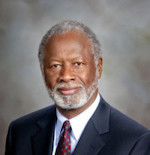This is a split screen moment in America. On one side of the screen, a former president is being memorialized this week not only for his service to country but for the principled life he personified with renowned caring and decency. On the other side of the screen, another former/future president is being remembered this week for the violent insurrection he inspired with his “stolen election” Big Lie before he appears in court Friday for his sentencing on 34 felony convictions.
The cognitive dissonance is extreme. We are peering at a freeze frame of our national schism over what makes America great. Is greatness a twice-impeached Donald Trump, who tried to extort a desperate Ukraine to dig up dirt on Joe Biden and then conspired to fraudulently prevent president-elect Biden from taking office? Or is greatness reflected instead in the caliber of American leadership the late Jimmy Carter represented as a Naval officer, state senator, governor, and 39th President of the United States who spent decades of his post-presidency as an unassuming global humanitarian?
What makes America genuinely great can’t bethe normalization of hateful degeneracy and promised retribution by an authoritarian government of, by, and for billionaires. What has always made America great are those who dream big for the benefit of mankind. History will judge the highs and lows of Jimmy Carter’s single term in the White House, but the standard he set as a true public servant in and out of power is undisputed and universally respected.
The peanut farmer-turned-improbable-president was complex and conflicted, but it was the integrity of his character, his commitment to make a meaningful difference in lives, and his wellspring of compassion that even divided Americans recognized when Carter died. He was seen for what he was: a man of faith who dedicated his life after the presidency to improving the world as a fulcrum for social justice, advancing democracy, and other noble causes.
Carter built metaphorical bridges internationally and actual houses for those who couldn’t afford a place to call home. He was a Nobel Peace Prize winner, handy with a tool belt and hammer, who went to work with other Habitat for Humanity volunteers. “The people he helped could never help him, either politically or financially,” said one observer, “what better legacy could you have to do things for others.”
That was private citizen Carter, from a tiny speck of a town in rural Georgia, who labored in a hard hat on housing construction into his 90s. An earnest, patient, proud man with a generous spirit of selfless giving that goes on in his memory. Is it him, and those who follow his lead, that make America great or those who wrap themselves in the flag and try to burn down the ideals it symbolizes?
Ohio Congresswoman Marcy Kaptur, D-Toledo, who served in the Carter administration, said her former boss “was a red, white and blue patriot” who didn’t wear his patriotism “on his sleeve like some folks that are beating their chest all the time. It was the way he lived that showed who he was.” Acknowledgement of that kind of admirable was bipartisan. The state’s congressional delegation knew what had been lost.
“Jimmy Carter was a good and honest man who devoted his life to service in the military and government and his work helping with affordable housing,” said Cincinnati Republican Brad Wenstrup. “President Carter’s legacy is one of kindness and humanitarianism,” Mike Carey, R-Columbus, added. “While our politics differed, he served our nation with honor,” stressed Republican Dave Joyce, R-OH-14.
To Max Miller, R-Rocky River, the late president “was a man of integrity. Thank you for your example.” Akron Democrat Emilia Sykes echoed the sentiment that Carter “was a decent and kind man who served as a model for every public servant to emulate.” He was a thoughtful, if not perfect, president who led by moral example — not incendiary tweets or petulant rants beneath the dignity of his office and certainly antithetical to Carter’s personal criterion of respectful conduct.
There was a time when Americans expected no less of their commander in chief. A time, not so long ago, when a presidential candidate who vowed to punish his political enemies, issue blanket pardons of insurrectionists who savagely beat their way into the U.S. Capitol, and order dehumanizing cruelty on a mass scale would have been shunned. When a criminally indicted defendant facing trial in four different jurisdictions would have been a joke as a presidential aspirant.
When a person convicted by a jury of his peers on 34 felony counts and separately of sexual abuse and defamation of his victim couldn’t possibly be elected to the highest office in the land. Yet, on Jan. 20, Donald Trump will again put his hand on a Bible to take the presidential oath he desecrated four years ago by trying to overturn a democratic election.
He has already ranted about the nation’s flags flying at half-staff through his inauguration in mourning for Carter.
America’s split screen has come into focus with the anniversary of the Jan. 6 attack, the president-elect being sentenced as a felon and the state funeral of the president from Plains, Ga. Grieve for the loss of honorable.
• • •• • •
This story is provided by Ohio Capital Journal, a part of States Newsroom, a national 501 (c)(3) nonprofit. See the original story here.














